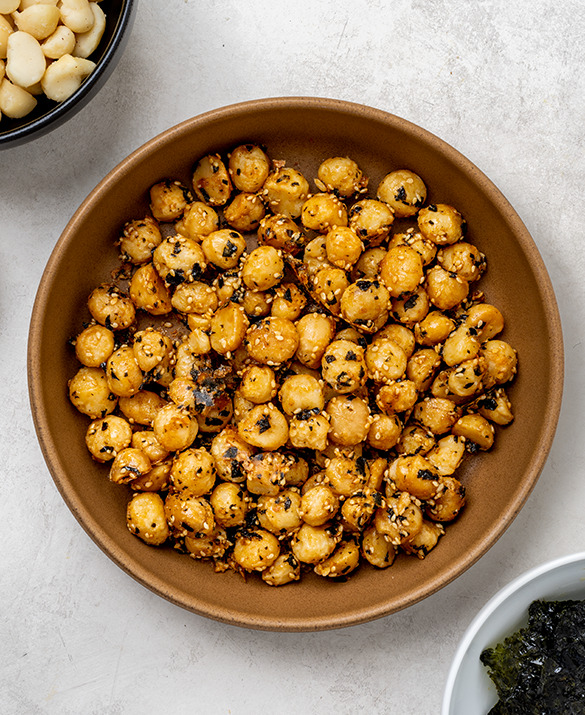If you’re like most of us, your heart is the center of your life. We value our hearts on many physical and emotional levels. From ensuring your body functions at an optimal level to the sentimental power we give our hearts in decision-making, relationships, and everything in between. Our hearts fuel not only our lives, but our passion for life.
And while our hearts carry some impactful and emotional weight, they are also one of our body’s most vulnerable organs. It’s an unfortunate reality that heart disease is the number one cause of death in the United States. The good news, however, is that most cardiovascular diseases are preventable! An easy way to prevent heart disease is by monitoring your cholesterol at an early age. And what better time to start than National Cholesterol Education Month!
Let’s take a look at what cholesterol is, how it affects your body, and how you can use macadamia nuts to champion your own heart health.
What is cholesterol?
Let’s get medical for a bit. According to the National Heart, Lung, and Blood Institute, cholesterol is a “waxy, fat-like substance that your body needs for good health, but in the right amounts.” While your body needs cholesterol to circulate your blood properly, unhealthy levels of cholesterol can lead to significant health complications.
Unhealthy cholesterol levels are often caused by lifestyle habits like low levels of physical activity or eating a diet low in nutritional value. The genetics you receive from your family also play a large role in your cholesterol health.
So what exactly does a healthy level of cholesterol look like? When we discuss a balanced total cholesterol level, there are two main proteins involved:
- Low-density lipoproteins (LDL), or “bad” cholesterol
- High-density lipoproteins (HDL), or “good” cholesterol
LDL is considered the “bad” cholesterol because high levels of LDL can produce fatty deposits that can build up and block blood vessels from pumping as efficiently as they should. This can lead to heart attack, stroke, and a range of other health conditions if not treated over time.
HDL is considered “good” because it carries cholesterol and fatty deposit buildup from your arteries and through the liver so it can be flushed out of your body. In fact, high levels of HDL can actually lower your risk of certain health complications.
Ways to control cholesterol now (so it’s not an issue later on)
Regulating and controlling your cholesterol now is so important because your blood health affects every organ in your body. And while it may sound like a big endeavor, there are actually several simple and fun ways you can support your cholesterol. Take a look!
- Eat healthy, whole foods
Whole foods generally have less of the bad saturated fats that can clog arteries. Regularly consuming a well-balanced diet can prevent not only heart disease but certain cancers, diabetes, immune complications…. The list goes on!
- Get active!
A great way to keep your heart pumping efficiently is to practice regular physical activity. From everyday favorites like yoga and biking to more intense training like weightlifting and surfing, there are dozens of activities you can find to fuel your heart (and soul!) Some researchers even believe that something as simple as completing a 30-minute walk every day can significantly reduce your risk of heart attack and disease.
- Reduce stress
Stress and anxiety play a huge role in your heart health. Stress can release hormones like Corticosteroids, which can cause your body to produce more cholesterol. Try finding simple activities you can do to lower your stress levels and practice mindfulness in your everyday. Your heart (and mood) will thank you!
- Understand your risk
From your personal lifestyle to your family genetics, it’s important to get an understanding of where your cholesterol levels are and where you could improve. Ask your doctor if you can schedule a cholesterol test. It’s a simple blood test taken after a period of fasting that can determine where your LDL and HDL levels reside.
It’s never too late, or early, to start thinking about your cholesterol. Whether you’re just starting out and your goals are preventative, or if you’re actively correcting a current cholesterol issue, always best to consult with your healthcare provider before beginning any personalized treatment or significant lifestyle change.
“Macadamia nuts are rich in tocotrienols, a form of vitamin E, that has antioxidant properties that can help lower cholesterol!”
How can macadamias help control cholesterol?
Now you’re probably wondering, what do macadamia nuts have to do with cholesterol? In addition to being a scrumptious whole food, macadamia nuts can help promote healthy cholesterol levels when eaten as part of a well-balanced diet and active lifestyle.
Macadamia nuts are rich in tocotrienols, a form of vitamin E, that has antioxidant properties that can help lower cholesterol! Additionally, the polyunsaturated and monounsaturated ‘good fats’ found in macadamias are vital nutrients for healthy hearts and balanced cholesterol levels and may even help prevent cardiovascular disease.
Not to mention a series of other health benefits of macadamia nuts like:
- The ‘Good Fats’ that help fight inflammation
- Macadamia nuts are superfoods!
- Plant Based, Whole Food Goodness!
Fueling your body, mind, and mood
At Love Macadamia™, we understand the importance of living a well-balanced life. From the foods we eat to the activities we perform, all of our choices play a significant role in our bodies, minds, and moods. That’s why it’s never too late (or too early!) to start making positive choices that can contribute to healthy cholesterol.
Want even more tips on how to maintain your healthy lifestyle? Visit the nutrition page of our website or our Pinterest board to learn more about the incredible benefits these darling nuts provide. If you find a tip you absolutely love, be sure to share it on social media using the hashtag #lovemacadamia and tagging @loveofmacadamia.
*The nutrition information is in alignment with the United States of America Food & Drug Administration (FDA) regulations. This may differ in other countries.






